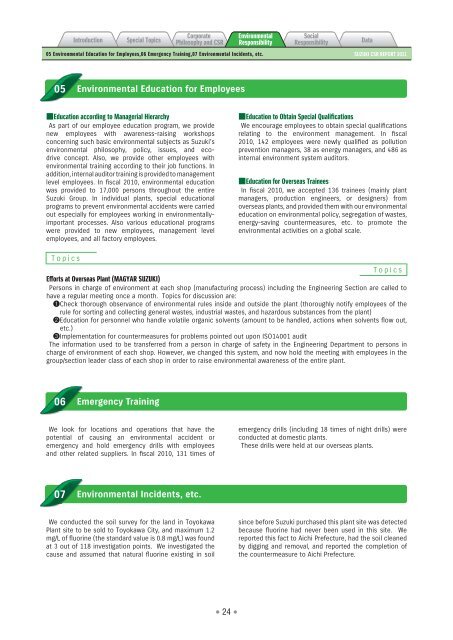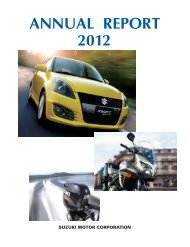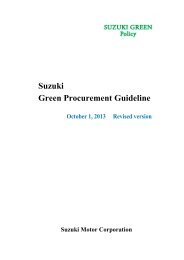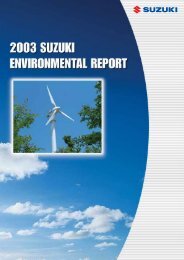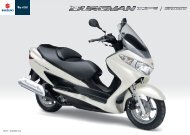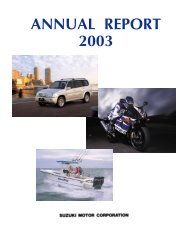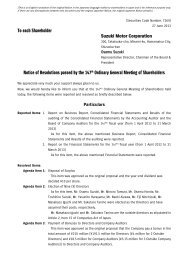2011 Suzuki CSR Report - global suzuki
2011 Suzuki CSR Report - global suzuki
2011 Suzuki CSR Report - global suzuki
You also want an ePaper? Increase the reach of your titles
YUMPU automatically turns print PDFs into web optimized ePapers that Google loves.
Introduction<br />
Special Topics<br />
Corporate<br />
Philosophy and <strong>CSR</strong><br />
Environmental<br />
Responsibility<br />
05 Environmental Education for Employees,06 Emergency Training,07 Environmental Incidents, etc.<br />
Social<br />
Responsibility<br />
Data<br />
SUZUKI <strong>CSR</strong> REPORT <strong>2011</strong><br />
05 Environmental Education for Employees<br />
■Education according to Managerial Hierarchy<br />
As part of our employee education program, we provide<br />
new employees with awareness-raising workshops<br />
concerning such basic environmental subjects as <strong>Suzuki</strong>'s<br />
environmental philosophy, policy, issues, and ecodrive<br />
concept. Also, we provide other employees with<br />
environmental training according to their job functions. In<br />
addition, internal auditor training is provided to management<br />
level employees. In fiscal 2010, environmental education<br />
was provided to 17,000 persons throughout the entire<br />
<strong>Suzuki</strong> Group. In individual plants, special educational<br />
programs to prevent environmental accidents were carried<br />
out especially for employees working in environmentallyimportant<br />
processes. Also various educational programs<br />
were provided to new employees, management level<br />
employees, and all factory employees.<br />
■Education to Obtain Special Qualifications<br />
We encourage employees to obtain special qualifications<br />
relating to the environment management. In fiscal<br />
2010, 142 employees were newly qualified as pollution<br />
prevention managers, 38 as energy managers, and 486 as<br />
internal environment system auditors.<br />
■Education for Overseas Trainees<br />
In fiscal 2010, we accepted 136 trainees (mainly plant<br />
managers, production engineers, or designers) from<br />
overseas plants, and provided them with our environmental<br />
education on environmental policy, segregation of wastes,<br />
energy-saving countermeasures, etc. to promote the<br />
environmental activities on a <strong>global</strong> scale.<br />
T o p i c s<br />
T o p i c s<br />
Efforts at Overseas Plant (MAGYAR SUZUKI)<br />
Persons in charge of environment at each shop (manufacturing process) including the Engineering Section are called to<br />
have a regular meeting once a month. Topics for discussion are:<br />
❶Check thorough observance of environmental rules inside and outside the plant (thoroughly notify employees of the<br />
rule for sorting and collecting general wastes, industrial wastes, and hazardous substances from the plant)<br />
❷Education for personnel who handle volatile organic solvents (amount to be handled, actions when solvents flow out,<br />
etc.)<br />
❸Implementation for countermeasures for problems pointed out upon ISO14001 audit<br />
The information used to be transferred from a person in charge of safety in the Engineering Department to persons in<br />
charge of environment of each shop. However, we changed this system, and now hold the meeting with employees in the<br />
group/section leader class of each shop in order to raise environmental awareness of the entire plant.<br />
06 Emergency Training<br />
We look for locations and operations that have the<br />
potential of causing an environmental accident or<br />
emergency and hold emergency drills with employees<br />
and other related suppliers. In fiscal 2010, 131 times of<br />
emergency drills (including 18 times of night drills) were<br />
conducted at domestic plants.<br />
These drills were held at our overseas plants.<br />
07 Environmental Incidents, etc.<br />
We conducted the soil survey for the land in Toyokawa<br />
Plant site to be sold to Toyokawa City, and maximum 1.2<br />
mg/L of fluorine (the standard value is 0.8 mg/L) was found<br />
at 3 out of 118 investigation points. We investigated the<br />
cause and assumed that natural fluorine existing in soil<br />
since before <strong>Suzuki</strong> purchased this plant site was detected<br />
because fluorine had never been used in this site. We<br />
reported this fact to Aichi Prefecture, had the soil cleaned<br />
by digging and removal, and reported the completion of<br />
the countermeasure to Aichi Prefecture.<br />
●<br />
24<br />
●


